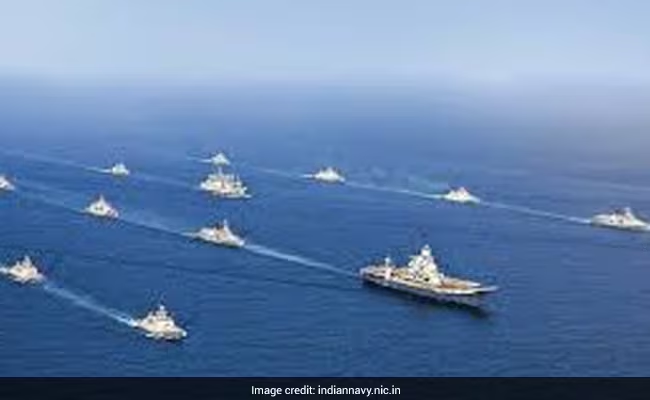
The high-voltage Malabar exercise featuring the navies of all four Quad countries - India, the US, Australia and Japan - began on Thursday off the coast of Guam in the backdrop of a resolve by the four nations to solidify cooperation for a free and open Indo-Pacific in view of China's rouge behaviour in the region.
A range of complex drills involving warships, aircraft and helicopters will be carried out during the four-day exercise, being hosted by the US Navy in the Western Pacific, officials said.
The US Seventh Fleet, in a statement, said the exercise demonstrated the commitment among the like-minded nations to uphold a rules-based maritime order in the Indo-Pacific.
The Indian Navy has deployed its stealth frigate INS Shivalik, anti-submarine warfare corvette INS Kadmatt and a fleet of P8I maritime surveillance aircraft in the 25th edition of the mega exercise.
The US Pacific Fleet's Arleigh Burke-class guided-missile destroyer USS Barry, naval special warfare forces, maritime patrol and reconnaissance aircraft from Task Force 72, and military sealift command's Henry J Kaiser-class underway replenishment oiler USNS Rappahannock are among the assets deployed by the US Navy in the exercise.
Under Commander, US Pacific Fleet, 7th Fleet is the US Navy's largest forward-deployed numbered fleet and routinely interacts and operates with 35 maritime nations in preserving a free and open Indo-Pacific region.
"Malabar-21 would witness complex exercises including anti-surface, anti-air and anti-submarine warfare drill, and other manoeuvres and tactical exercises. The exercise will provide an opportunity for participating navies to derive benefit from each other's expertise and experiences," Indian Navy Spokesperson Commander Vivek Madhwal said.
The US 7th Fleet said the first phase of the exercise is an opportunity for the four Indo-Pacific navies to operate together to strengthen their skills in "combined maritime operations, anti-submarine warfare operations, air warfare operations, live-fire gunnery events, replenishments-at-sea and cross-deck flight operations."
"Malabar 21 is an excellent opportunity to conduct multi-national training to hone warfighting and maritime security skillsets," said Capt. Chase Sargeant, Commander, Task Force (CTF) 71 of US 7th Fleet.
"US destroyers closely integrating with our partners and allies builds the foundation for regional security and stability that benefits all Indo-Pacific nations," he said.
In an interactive session at the Observer Research Foundation (ORF), Commander of the US Indo-Pacific Command Admiral John Aquilino on Wednesday spoke about key challenges facing the Indo-Pacific and delved into China's rapid military build-up including in the maritime domain.
Admiral Aquilino also hinted at the possibility of increasing the number of participants at the Malabar naval exercise if leaders of the four participating countries concur with it.
Following India's invitation, Australia participated in the Malabar exercise last year that effectively made it a drill by all four member nations of the Quad.
China has been suspicious about the purpose of the Malabar exercise as it feels that the annual naval exercise is an effort to contain its influence in the Indo-Pacific region.
The Malabar exercise started in 1992 as a bilateral drill between the Indian Navy and the US Navy in the Indian Ocean. Japan became a permanent member of the exercise in 2015. This annual exercise was conducted off the coast of Guam in 2018 and off the coast of Japan in 2019.
Last year, the exercise was hosted in two phases in the Bay of Bengal and the Arabian Sea.
There have been mounting global concerns over China's growing military assertiveness in the Indo-Pacific region.
India, the US, Australia, Japan and many other like-minded countries are working towards ensuring a free, open and inclusive Indo-Pacific.
(Except for the headline, this story has not been edited by NDTV staff and is published from a syndicated feed.)
Track Latest News Live on NDTV.com and get news updates from India and around the world

